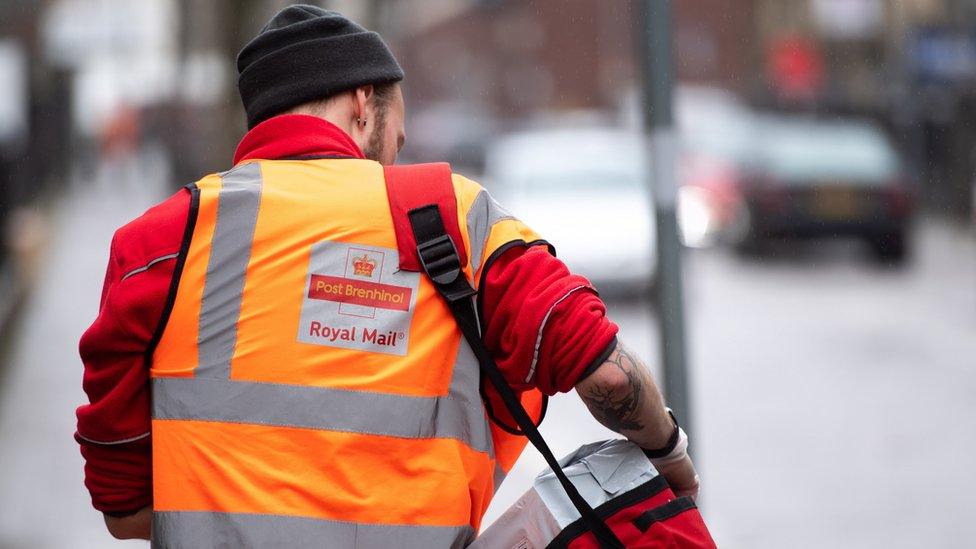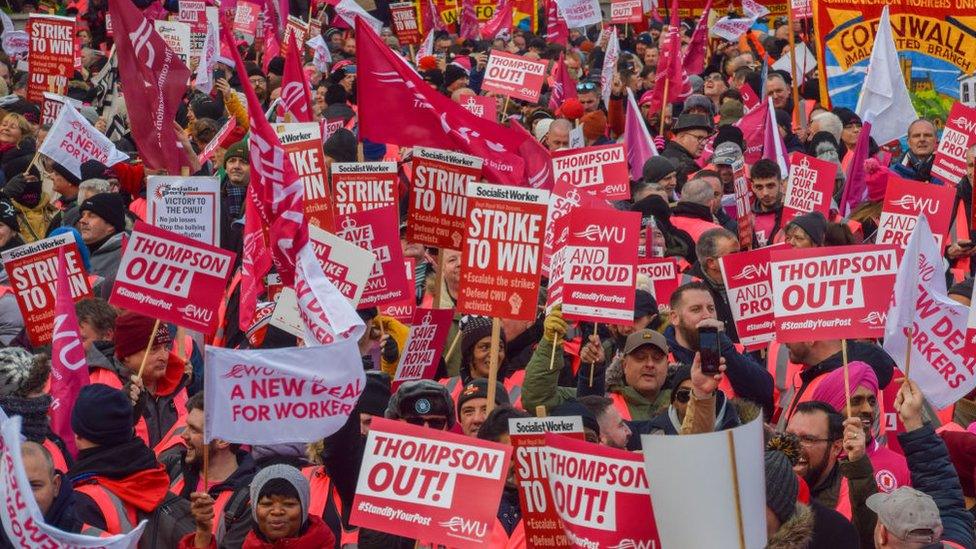Royal Mail strikes: When are postal workers walking out again?
- Published

Postal workers will not take planned industrial action on 16 February, after it was blocked by a legal challenge from Royal Mail.
About 115,000 workers had been expected to walk out as part of a long-running dispute over pay and conditions.
When is the next Royal Mail strike?
Staff will no longer strike on Thursday, 16 February, after Royal Mail challenged the way the industrial action had been called, citing a "legal error".
The Communication Workers Union (CWU) confirmed the strike action would not go ahead.
CWU staff walked out on 9, 11, 14, 15, 23 and 24 December, causing disruption Royal Mail said had cost it millions of pounds.
The last suggested Christmas posting dates, external were brought forward as a result.
How do strikes affect deliveries?
On strike days, the Royal Mail says it will not be able to deliver first and second-class letters.
However, it will deliver as many parcels and Special Delivery letters as possible.
The timescale commitment offered on Special Delivery Guaranteed items will be suspended the day before any strike.
People will not be able to claim compensation for late deliveries.

Christmas posting dates were brought forward as a result of the December strikes
Royal Mail delivery offices and customer service points will be closed. Letters will not be collected from post boxes.
The Post Office is a separate business and post offices are expected to open, although some have closed during previous strikes.
In those that do open, you may not be able to post letters and parcels as you usually would, but other services such as bill payments and banking should run as normal.
How much are Royal Mail workers paid?
Workers are striking over pay and conditions.
Median pay at Royal Mail is £32,465 a year, and the average pay for a postal delivery worker is £25,777.
Royal Mail has offered a pay deal which it says is worth up to 9% over 18 months.
However, this is below the current rate at which prices are rising: inflation was 10.5% in the year to December.
The CWU wants a higher pay offer. It also objects to proposed changes to working conditions, such as ending a number of allowances and the introduction of compulsory Sunday working.
What does Royal Mail say?
Royal Mail is moving from its traditional business of delivering letters - which is no longer profitable - to the fast-growing world of parcel deliveries, driven by the increasing popularity of online shopping.
It faces stiff competition from other couriers, which give their workers less generous pay and benefits.
The company says it is losing about £1m a day, and cannot afford to give its workers a higher pay rise.

Many postal workers want Royal Mail CEO Simon Thompson to resign
It says strikes have added £100m to its losses, and has announced plans to cut up to 10,000 jobs.
The company says it has improved its offer to workers, including more generous redundancy terms and a profit-sharing scheme.
On 24 November, Royal Mail said it had made its "best and final offer", and accused the union of "holding Christmas to ransom".
The company welcomed the cancellation of the planned February strike, intending "to use this time and space for further discussions to try to agree a deal".
The CWU said that if these talks fail, it will "significantly step up the programme of strike action".
Who owns Royal Mail?
Royal Mail was owned by the government until 2013, when it was privatised.
Shares were sold to financial institutions and private individuals, with 10% reserved for Royal Mail employees.
About 6% of the company is now owned by employees.